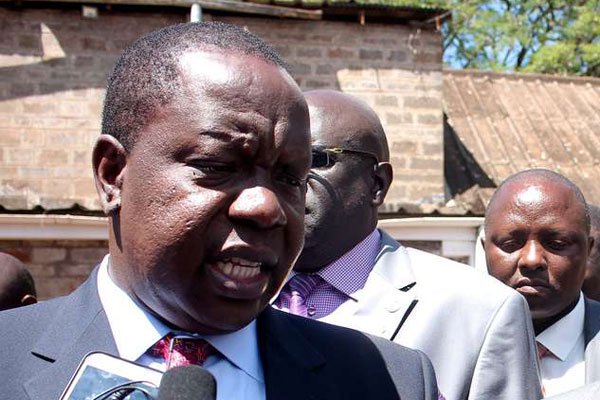After the announcement of the KCSE results on 20 December 2017, the Kenyan media has covered a contradicting image of schools, parents, students and education trade unionists that used to be in jovial mood in the years dating back from 2015 and below and who are today in sadness and calling for the investigation of how marking process was undertaken. On the other hand, the Education CS has maintained the results he declared were a reflection of reality. Source? (Source: The Daily Nation)
Comments:
The KCSE 2017 candidates are the fourth batch of the 2003 Free Primary Education, which was a culmination of the historical election of Mwai Kibaki as the third President of Kenya after the long serving Moi era of 24 years. He delivered a campaign promise that was well received by masses but poorly executed by the policy makers. This included mega financial scandals in the ministry of education that was facing a lot of pressure with high pupils turn out never witnessed in the history of Kenya. Kenya is languishing in serious educational crisis that has seen university and other colleges churning out graduates with no enough employment opportunities and they said that few opportunities are accessible through nepotism or bribery etc. This has caused numerous social upheavals never witnessed before with youths resulting to extremely exhaustive options of making ends meet including prostitution and acting pornography videos, robbery, high levels of stress and desperation for materialistic lifestyle etc., while those in the positions of power are engrossed in plundering of public resources for self-aggrandizement at the expense of the clamoring for change citizens.
As any secular-capitalist country, Kenya’s education policy is designed to lay the foundations for neo-slavery in future since it is anchored on Western colonialism that views the poor men as working machines in their companies with meager pay and remunerations. Hence, the education system was crafted to hoodwink the masses that they are being educated to better their lives; but alas, they were being nurtured to become well in serving the rich capitalists and in turn be rewarded for their dedicated services! On the other hand, the capitalist ensured that the survival of man is dependent in serving them perpetual.
The capitalists wanted educated and paper-confirmed servants of which its purpose was not knowledge per se aimed at imparting and improving the thinking and scholarly approach in dealing with societal issues but its foundation was anchored on a necessity for employment opportunities period! With such a foundational approach compounded with Western values of liberalism and freedoms, we saw multitudes of so-called scholars who were immediately employed in the capitalists’ institutions to further the capitalist agenda. The level of education and especially the university level determine the success of a person. This led to the famous saying ‘chasing after papers’ as it was confirmed by the conniving institutions which are known as centers of manufacturing papers due to the high demand by employment institutions which were so interested in papers than ‘experience’ in their employment criterion. Therefore, they introduced grading system in marking exams and successful are those that got higher grades using any means at their disposal even if it meant cheating in exams so be it! Passing of exams became a matter of life or death.
The solution to this uproar lies is in the alternative pure Islamic ideology under the Khilafah state that emanates from Allah (swt), the Creator of creation and knows what is best and bad for His creation. Hence, the Islamic creed constitutes the basis upon which the education policy is built. The curriculum and methods of teaching are all designed to prevent a departure from this basis while the objective of education is to form the Islamic personality in thought and behaviour.
The Islamic culture must be taught at all levels of education. In higher education, departments should be assigned to the various Islamic disciplines as will be done with medicine, engineering, physics etc. Arts and crafts may be related to science, such as commerce, navigation and agriculture arts and crafts. In such cases, they are studied without restrictions or conditions. Sometimes, however, arts and crafts are connected to culture when influenced by a particular viewpoint of life, such as photography or sculpture. If this viewpoint of life contradicts the Islamic viewpoint of life, such arts and crafts, then it is not adopted. The State’s curriculum is one. No curriculum other than that of the State is allowed to be taught. Private schools are allowed as long as they adopt the State’s curriculum and establish themselves on the State’s educational policy and accomplish the goal of education set by the State.
It is an obligation upon the State to teach every individual, male or female, those things that are necessary for the mainstream of life. This should be obligatory and provided freely in the primary and secondary levels of education. The State should, to the best of its ability, provide the opportunity for everyone to continue higher education free of charge. The State provides libraries and laboratories and all means of knowledge outside schools and universities to enable those who want to continue their research in the various fields of knowledge, like fiqh, Hadith and tafseer of Qur’an, thought (fikr), medicine, engineering and chemistry, inventions, discoveries, etc. This is done to create in the Ummah an abundance of mujtahideen, outstanding scientists and inventors.
Ali Nassoro Ali
Member of the Media Office of Hizb ut Tahrir in Kenya

